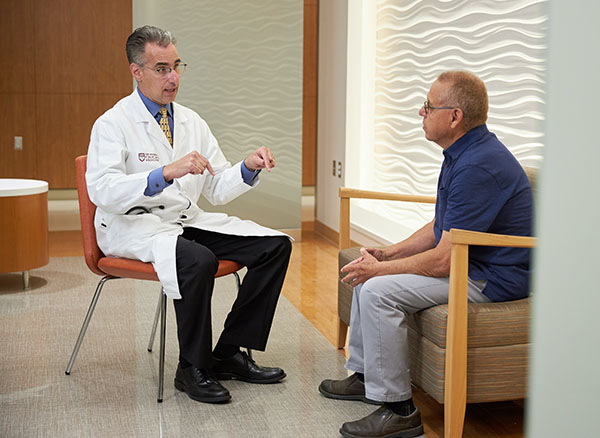Biologics and Inflammatory Bowel Disease (IBD)
Hi. I'm Dr. Russ Cohen from the University of Chicago. I'm a Professor of Medicine and the director of the Inflammatory Bowel Disease Center. Today's quick bite is regarding a new medication vedolizumab, otherwise known as Entyvio. Vedolizumab is a very exciting addition to the group of medicines that we use to treat patients with inflammatory bowel disease. In fact, this is the very first medicine that was approved the same day for both ulcerative colitis and Crohn's disease by the FDA.
This medication is given by an IV every two months, although the first few months you get three doses kind of as a kick off to get your body set with the drug. One of the very exciting things about vedolizumab is that it seems to be a very safe medication. In fact, we're not aware of any major side effects from the medicine unless you're allergic to it. And we're not aware of any major concerns for infections or tumors arising from using a medicines such as vedolizumab.
One of the neat things about this medicine is how it works. So in patients with Crohn's and colitis, the problem is the white blood cells are attacking the intestines. Well, in order for the white blood cells to get into the intestines, they first have to get out of the bloodstream where they're patrolling around. It prevents the white blood cells from getting out of the blood vessels into the intestinal lining. As a result, there's is less influx of the white blood cells into the tissue. So the inflammation does not have many white blood cells, and over time we think it actually helps prevent the white blood cells from getting in and continuing new inflammation in these patients.
One of the nice things about vedolizumab, it's that we have some patients who can't be on other medicines because of problems they may have elsewhere in the body, such as previous lung infections or skin problems and joint issues. Since vedolizumab is only for the gut, we then can use this medicine in patients who may not be able to use other medicines if they were to have Crohn's and colitis plus other conditions.
Many patients wonder, well, this is a new medicine, how do we know that it's going to be safe for me? And I think that's a very good point. Although the medicine just came out in May of 2014, it actually has been under study for many years before that. Given the fact that it's specific for the intestines, our expectations were that we would not see problems with infections, or tumors, or other problems elsewhere in the body, and that actually has shown to be the case.
However, we do constantly monitor patients who are on medicines, whether they be new or old medications. And this information can be updated in the future. There will be many future medicines in the same family as vedolizumab if things go as planned. They're currently under investigation. Many of them are very specific for the intestinal lining only. And while the benefits are those that we might enjoy in gastrointestinal disease, that may not be a good choice for patients who maybe also have joint pains or skin reactions related to their Crohn's and colitis. Those patients may do better with a medicine that more broadly affects the body.
So the exciting part from today's quick bite is that a new medicine for both Crohn's disease and ulcerative colitis has come out. It's effective in both conditions. It works well long term, and it's something that offers our patients and their caregivers other options for Crohn's and colitis. This is Dr. Russ Cohen with today's quick bite.
What are Biologic Medicines (Biologics)?
Biologic medicines, also known as biologics, have been shown to be very safe and effective in people with inflammatory bowel disease (IBD). In fact, these drugs have become the standard of care for people with moderate to severe Crohn’s disease or ulcerative colitis.
At the IBD Center at the University of Chicago Medicine, we may recommend a biologic as part of your personalized treatment plan. Starting on these medications early in the course of your treatment can help you achieve remission and relief from your symptoms more quickly.
How Biologics Treat IBD
Biologic are used to treat IBD because they help the immune system target certain proteins that cause inflammation. They work by blocking chemical messages from the immune system that trigger a cascade of inflammatory events in people with IBD.
In both types of IBD, the body’s immune system attacks the gastrointestinal (GI) tract. Researchers believe the immune system is responding to normal bacteria and other organisms in the body that it perceives as threats. Biologics interrupt these attacks by mimicking proteins that the body naturally makes on its own to “turn down” the immune system.
Biologics are administered by infusion through an intravenous (IV) line or self-administered in the form of an injection.
Different Types of Biologics for IBD
Many classes of biologics are available to treat IBD, including:
- Tumor necrosis factor-alpha (TNF-alpha) blockers, which were the first class of biologics approved to treat IBD in the United States. They work by blocking a small protein that causes inflammation in the intestine. Examples of TNF-alpha blockers include Remicade® (infliximab), Humira® (adalimumab), Simponi® (golimumab) and Cimzia® (certolizumab pegol). These biologics also can help heal the intestine.
- Integrin blockers, which prevent white blood cells that cause inflammation from entering the GI tract. Entyvio® (vedolizumab) is approved in the United States for treating IBD. Tysabri® (natalizumab) is approved for patients with moderate to severe Crohn’s disease who do not respond to other types of therapy.
- Interleukin blockers, which target interleukin-12 and interleukin-23, two proteins associated with inflammation in the GI tract. An example is Stelara® (ustekinumab), which was first approved to treat dermatologic conditions and is now approved in the United States for treating IBD.
Biosimilars vs. Biologics for IBD
Biosimilars are also becoming available to treat IBD. Biosimilars could be thought of as “generic biologics,” although they are much more difficult to manufacture than a typical generic drug. Biosimilars of Remicade® (infliximab) are currently on the market and are sold under the names Avsola®, Inflectra® and Renflexis®. More biosimilars will become available in the future.
Biosimilars that are approved in the United States must meet very strict criteria so that they have the same safety and efficacy as the original biologic drug.

Choosing the Right Biologic for IBD
Your GI specialist will determine which biologic is right for you based on a number of factors. These include:
- Whether you have Crohn’s disease or ulcerative colitis
- The severity of your IBD
- Your medical history, including whether you have had previous infections or cancer
- Your age
- Whether you have fistulas, which are abnormal connections between parts of the body, and/or perianal disease
- Your ability to give yourself shots
- Your distance from an infusion center
- Your insurance plan and the financial assistance available to you from various drug companies
Within days or weeks of starting on a biologic, you may notice your symptoms becoming less severe. However, everyone is different, and some medicines may work more quickly than others. Your GI specialist may start with a smaller dose and gradually increase it until you notice its effects.
What is most important is finding the right medication for you over the long term so that you can have a lasting remission without IBD symptoms.
Switching Biologics During IBD Treatment
You and your GI specialist may decide to switch your biologic for several reasons. These include:
- If you are experiencing side effects from your medicine
- If you are not seeing any improvement even after increasing the dose
- If you are a woman trying to become pregnant because some biologics are better for pregnant women
At UChicago Medicine, we will closely monitor you for side effects and make sure you are on the best biologic for you. We recommend that you see our team at least every three months so that we can make a switch if needed.

Nationally Ranked in Gastroenterology and GI Surgery
According to U.S. News & World Report's 2024-25 Rankings.
Learn more about U.S. News Best HospitalsFind IBD Services at a Chicagoland Location Near You
Request an Appointment
We are currently experiencing a high volume of inquiries, leading to delayed response times. For faster assistance, please call 1-888-824-0200 to schedule your appointment.
If you have symptoms of an urgent nature, please call your doctor or go to the emergency room immediately.
You can also schedule an appointment instantly for in-person and video visits through our online scheduling portal.
* Indicates required field
